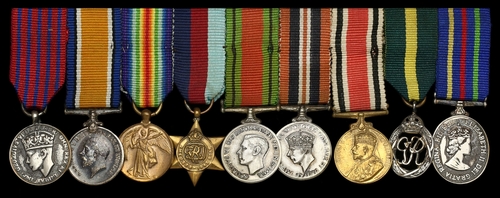
Auction: 25003 - Orders, Decorations and Medals
Lot: 325
The mounted 1940 'Bomb Disposal' G.M. group of nine dress miniatures attributed to Lieutenant-Colonel S. W. Warwick, Durham Light Infantry, who served in the Durham Pals during the Great War, being severely wounded at Lys only to return to active service in the Second World War to deal with bomb disposal
George Medal, G.VI.R.; British War and Victory Medals; 1939-45 Star; Defence and War Medals 1939-45; Special Constabulary L.S.&.G.C., G.V.R.; Territorial Decoration, G.V.R.; Civil Defence Long Service, E.II.R., mounted as worn, good very fine (9)
Provenance:
Wallis & Wallis January 2012.
Note the Recipient's full sized awards are held by the Durham County Council.
G.M. London Gazette 22 January 1941, the original recommendation states:
'Until September 11th 1940, Captain Warwick, Staff Officer Air Defence, was responsible for all arrangements in connection with the disposal of unexploded bombs. He had personally to detonate "in situ" or to defuse, a large number of bombs, including the heaviest type. During this period the equipment was incomplete and his staff and helpers were quite untrained.
Especially commendable work was carried out by him following raids at Middlesbrough on the 19th and 26th June, when he defused bombs without consideration for delayed action and thereby saved considerable stoppage of production at the ICI Works
I feel very much credit is due to Captain Warwick, whose personal example and enthusiasm were the governing factors in the building up, under most difficult conditions, of the Domb Disposal Sections which did such magnificent work during the later raids.
His attitude and complete fearlessness set them the very high standard which is fully reflected in the present work of the sections.
I am of the opinion that Captain Warwick's work merits very special commendation.'
T.D. London Gazette 21 November 1950.
Samuel Wood Warwick was born at Blackhill, Durham on 14 November 1897, the son of George and Elizabeth Warwick. Educated at Westoe School, South Shields and later Dutherford Technical College he enlisted with the 18th (1st County) Battalion, Durham Light Infantry in 1914 he entered the war in France in December 1916 with the 8th Battalion Yorkshire and Lancashire Regiment.
Wounded in action at Zillebeke on 7 June, he returned to Britain and was commissioned 2nd Lieutenant with the 20th (Wearside) Battalion in March 1918. Returning to France with them on 21 October 1918 he went into action near the River Escaut on the First Dat of the Battle of Coutrai where he was seriously wounded in action. The Battalion War Diary notes:
'Battalion took part in an attack at zero 7.30 am through the 35th Division. Objective being the River Escaut on v13 and u14. Weather showery causing ground to be very heavy. On nearing the final objective considerable resistance was encountered MG fire was very heavy, enemy field guns were also very active. In spite of this the battalion fought its way forward a distance of 6.000x on account of there being exceptionally heavy MG fire from left flank and that flank being exposed for a distance of about 3,000x a defensive flank was formed along the line U 12.c.5.8. to U 5.c.53. Front company Poeldriesch and established a line from U 18.a.3.6. along road to U 12.c.6.5. his line was consolidated during the light and patrols were pushed forward.
Casualties- 2nd Lieut. JW Armstrong- killed- 2nd Lieut. J. Wood and 2nd Lieut. SW Warwick wounded. Ors killed and 45 Ors wounded.'
Despite his wounds, Warwick was advanced Lieutenant on 29 November 1919 but the severity of his wounds saw him relinquish his commission on 25 March 1920. These same injuries saw him remain in hospital for some time, only joining the Reserve of Officers on 28 June 1922.
Between the wars he served first as a health inspector before becoming a National Coal Board Welfare Officer. He was posted to the 9th Battalion, Durham Light Infantry as a Lieutenant on 4 December 1936.
Mobilised as Captain on 18 March 1940 he was quickly drawn into bomb disposal work, being appointed Staff Officer, Air Defence on 24 February 1941, with a local newspaper stating of his work:
'In the capacity of Staff Officer, Air Defence, Captain Warwick was responsible for the disposal of unexploded bombs over an area of more than two counties.
Before the formation of Bomb Disposal Squads he was the only officer in the area with any training in the subject and undertook a terrific amount of work which entailed much risk to himself. His successful removal of unexploded bombs from the premises of concerns engaged in war production and from other vital places resulted in both a double recommendation, from both civil and military sources.
On one occasion he had 164 unexploded bombs reported to him in a single day.'
Warwick was later to see work as a Staff Officer in Nirth Africa, being advanced Major on 5 November 1942. After the War he was to serve with the 151st Field Ambulance, Royal Army Medical Corps (Territorial Army) and final as Secretary to the Army Cadet Force, Durham. Retiring in February 1956 he was appointed Honorary Lieutenant-Colonel and, that same year, Deputy Lieutenant of County Durham; sold together with copied research.
Subject to 20% VAT on Buyer’s Premium. For more information please view Terms and Conditions for Buyers.
Sold for
£320
Starting price
£140




